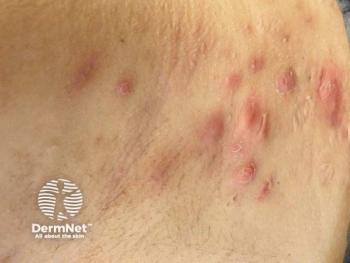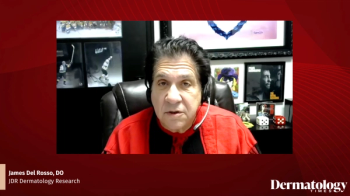
John Barbieri, MD, MBA, FAAD: Evidence-Based Recommendations and Good Practice Statements From the AAD Acne Guidelines
Barbieri spoke with Dermatology Times to discuss the new guidelines and the recommendations and good practice statements included.
The American Academy of Dermatology (AAD)
In the guidelines, strong recommendations were made for topical benzoyl peroxide, retinoids, and/or antibiotics and their fixed-dose combinations, and for oral doxycycline. Additionally, oral isotretinoin was strongly recommended for severe acne and acne scarring.
The group also made condition recommendations and good clinical practice recommendations for various other topical therapies, combined oral contraceptives, systemic antibiotics, and more.
John Barbieri, MD, MBA, FAAD, is co-chair of the AAD’s Acne Guideline Workgroup. He is also the director of the Advanced Therapeutics Acne Clinic at Brigham and Women's Hospital and an assistant professor of dermatology at Harvard Medical School.
Barbieri recently spoke with Dermatology Times to discuss details of the new guidelines, including the evidence-based recommendations and good practice statements for topical therapies and systemic antibiotics, criteria for recommendations, and more.
Q&A
Dermatology Times: Can you provide more details on the evidence-based recommendations and good practice statements, particularly those related to the use of topical therapies, systemic antibiotics, and oral isotretinoin?
A: For topical acne regimens, most single agent treatments have limited efficacy as monotherapy. As a result, it is often necessary to use multimodal treatment approaches that combine multiple mechanisms of action. For instance, combining a topical retinoid, a topical antibiotic, and benzoyl peroxide. In addition, we now have a novel topical antiandrogen, clascoterone, that can complement our other topical medication classes. Clascoterone also seems to be extremely well tolerated from the standpoint of irritation, which is important as some patients struggle to tolerate topical retinoids and benzoyl peroxide. Clascoterone can be a valuable treatment for both female and male patients with acne, and it will be important for patients to have access to this treatment.
Minocycline and doxycycline are currently prescribed in roughly equal proportions for the management of acne. However, while there is no evidence to suggest minocycline is more effective than doxycycline, it can be associated with rare by serious side effects such as vestibular dysfunction, autoimmune hepatitis, drug-induced lupus, and drug reaction with eosinophilia and systemic symptoms (DRESS). As a result, while we have a strong recommendation for the use of doxycycline, we have a conditional recommendation for the use of minocycline. We should consider whether reducing use of minocycline might be beneficial to our overall care of patients with acne. In addition, we discuss that use of trimethoprim-sulfamethoxazole should be limited due to risk of severe adverse reactions such as Stevens-Johnson syndrome/toxic epidermal necrolysis and acute respiratory failure.
Dermatology Times: What specific criteria were used to determine strong recommendations versus conditional recommendations, and how were the benefits, risks, and burdens assessed for each treatment option?
A: The AAD is in the process of transitioning from using Strength of Recommendation Taxonomy (SORT) to the Grading of Recommendations, Assessment, Development, and Evaluation (GRADE) approach. In this approach, following a systematic review of the literature, the benefits and harms of each treatment are summarized similar to what would be done in a Cochrane review. Per the GRADE approach, the work group then reviews this evidence and evaluates the treatment based on a variety of factors including benefits and harms, patient values and preferences, resource use, and certainty of evidence. Through this GRADE evidence-to-decision framework, treatments are given either a strong or conditional recommendation for or against their use. It is important to note that a conditional recommendation does not mean that a treatment is not valuable or should not be covered by payers. It is expected that many recommendations will be conditional with the GRADE approach and this recommendation still implies that we believe that most individuals would want the recommended course of action. As we transition from SORT to GRADE, it will be important for key stakeholders to understand these nuances regarding recommendation statements.
Dermatology Times: Could you elaborate on the considerations for recommending oral isotretinoin and under what circumstances it is strongly recommended, such as severity of acne, psychosocial burden, or failure of standard treatments?
A: Isotretinoin is an incredibly valuable treatment in the management of acne, and it is the only treatment that can reliably result in long-term acne clearance. However, it is not without potential side effects such as dry skin and eyes, joint pains, muscle aches, sun sensitivity, and more rarely changes to mood, vision, or hair. As a result, it should be used thoughtfully after a thorough discussion of risks and benefits with a dermatologist. Those who have severe acne or acne that is causing scarring, those with significant psychosocial effects from their acne, and those who have not improved with other acne treatments are good potential candidates for isotretinoin. Notably, population-based studies suggest that isotretinoin is associated with improvements in mood and reduced risk of adverse neuropsychiatric outcomes compared to other acne treatments. While isotretinoin likely can rarely cause mood changes which warrants close monitoring during use, because it is such a good acne treatment and since acne itself is associated with negative effects on mood, the expectation is for improved overall mood with isotretinoin treatment.
Dermatology Times: Regarding the good clinical practice recommendations, how should dermatologists approach the combination of systemic antibiotics with benzoyl peroxide and other topical therapies? Are there specific considerations for different patient populations?
A: Oral antibiotics are the most commonly prescribed systemic treatment for acne and dermatologists prescribe more antibiotics per clinician than any other major specialty. As a result, we should be thoughtful about limiting our use of antibiotics and considering when other options such as hormonal therapy (i.e. combined oral contraceptives, spironolactone) or isotretinoin might be better options. When using topical or oral antibiotics, they should always be combined with benzoyl peroxide to prevent the development of antibiotic resistance. We also now have a narrow-spectrum tetracycline-class antibiotic, sarecycline, that might reduce off target effects on the microbiome, though there is a need for comparative effectiveness clinical trials versus other antibiotics like doxycycline.
Dermatology Times: The guidelines mention a conditional recommendation against adding broadband light to adapalene 0.3% gel. What evidence or considerations led to this recommendation, and are there other similar combinations that were evaluated?
A: Although we were typically limited in our ability to make recommendations about physical modalities such as laser and light treatments, one of the randomized controlled trials that we reviewed found that adding broadband light to adapalene 0.3% gel did not provide better efficacy but was associated with harms such as hyperpigmentation and purpura. For this reason, the workgroup had a conditional recommendation against its use.
Newsletter
Like what you’re reading? Subscribe to Dermatology Times for weekly updates on therapies, innovations, and real-world practice tips.










